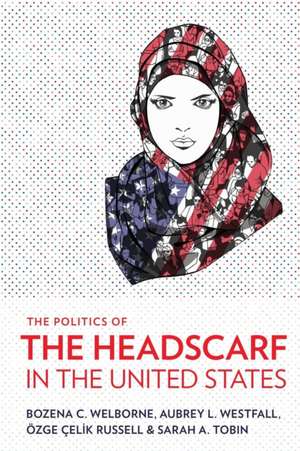The Politics of the Headscarf in the United States
Autor Bozena C. Welborne, Aubrey L. Westfall, Özge Çelik Russell, Sarah A. Tobinen Limba Engleză Paperback – 14 mai 2018
Transcending contemporary political debates on the issue of Islamic head covering, The Politics of the Headscarf in the United States addresses concerns beyond the simple, particular phenomenon of wearing the headscarf itself, with the authors confronting broader issues of lasting import. These issues include the questions of safeguarding individual and collective identity in a diverse democracy, exploring the ways in which identities inform and shape political practices, and sourcing the meaning of citizenship and belonging in the United States through the voices of Muslim-American women themselves.
The Politics of the Headscarf in the United States superbly melds quantitative data with qualitative assessment, and the authors smoothly integrate the results of nearly two thousand survey responses from Muslim-American women across forty-nine states. Seventy-two in-depth interviews with Muslim women living in the United States bolster the arguments put forward by the authors to provide an incredibly well-rounded approach to this fascinating topic.
Ultimately, the authors argue, women's experiences with identity and boundary construction through their head-covering practices carry important political consequences that may well shed light on the future of the United States as a model of democratic pluralism.
-- "Reading Religion"
| Toate formatele și edițiile | Preț | Express |
|---|---|---|
| Paperback (1) | 215.42 lei 6-8 săpt. | |
| Wiley – 14 mai 2018 | 215.42 lei 6-8 săpt. | |
| Hardback (1) | 721.37 lei 6-8 săpt. | |
| MB – Cornell University Press – 14 mai 2018 | 721.37 lei 6-8 săpt. |
Preț: 215.42 lei
Nou
41.22€ • 42.95$ • 34.13£
Carte tipărită la comandă
Livrare economică 03-17 aprilie
Specificații
ISBN-10: 1501715372
Pagini: 264
Dimensiuni: 152 x 228 x 18 mm
Greutate: 0.39 kg
Editura: Wiley
Descriere
The Politics of the Headscarf in the United States investigates the social and political effects of the practice of Muslim-American women wearing the headscarf (hijab) in a non-Muslim state. The authors find the act of head covering is not politically motivated in the U.S. setting, but rather it accentuates and engages Muslim identity in uniquely American ways.
Transcending contemporary political debates on the issue of Islamic head covering, The Politics of the Headscarf in the United States addresses concerns beyond the simple, particular phenomenon of wearing the headscarf itself, with the authors confronting broader issues of lasting import. These issues include the questions of safeguarding individual and collective identity in a diverse democracy, exploring the ways in which identities inform and shape political practices, and sourcing the meaning of citizenship and belonging in the United States through the voices of Muslim-American women themselves. The Politics of the Headscarf in the United States superbly melds quantitative data with qualitative assessment, and the authors smoothly integrate the results of nearly two thousand survey responses from Muslim-American women across forty-nine states.
Seventy-two in-depth interviews with Muslim women living in the United States bolster the arguments put forward by the authors to provide an incredibly well-rounded approach to this fascinating topic. Ultimately, the authors argue, women's experiences with identity and boundary construction through their head-covering practices carry important political consequences that may well shed light on the future of the United States as a model of democratic pluralism.
